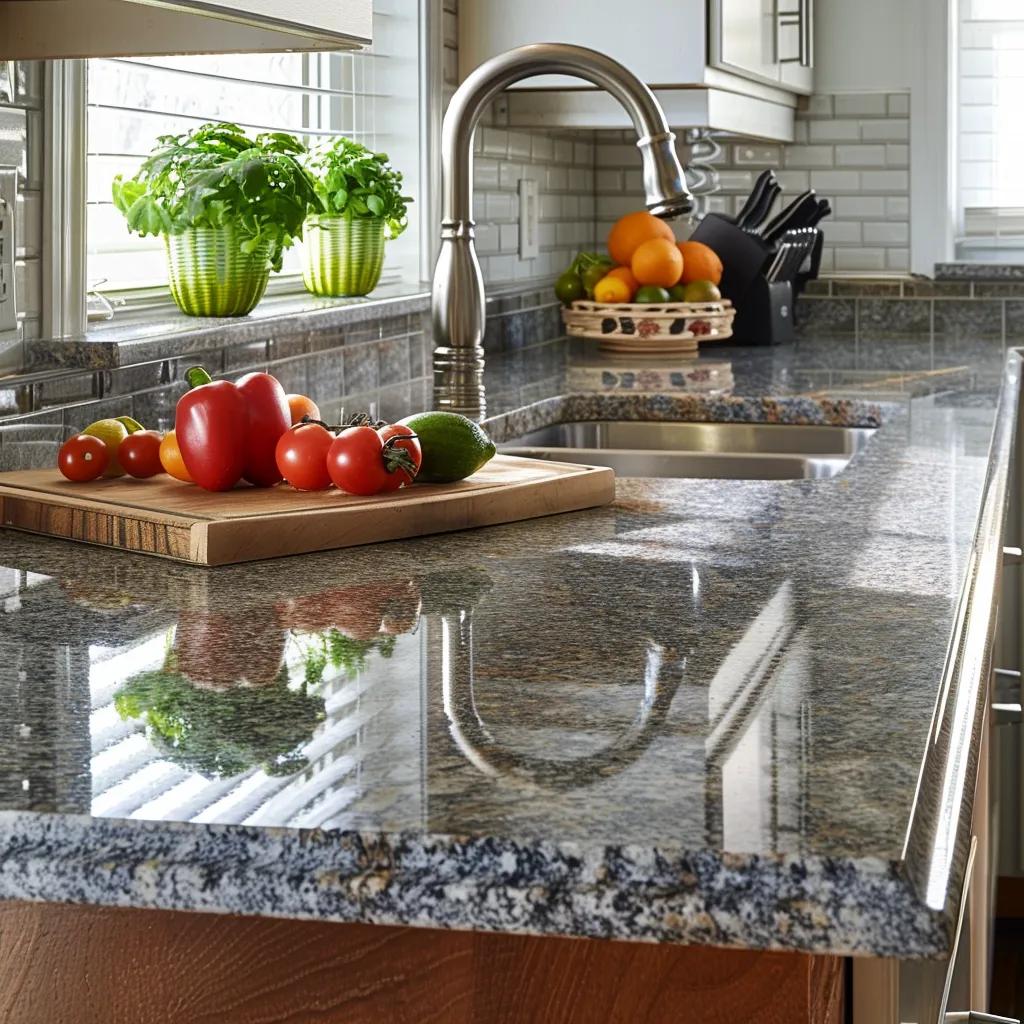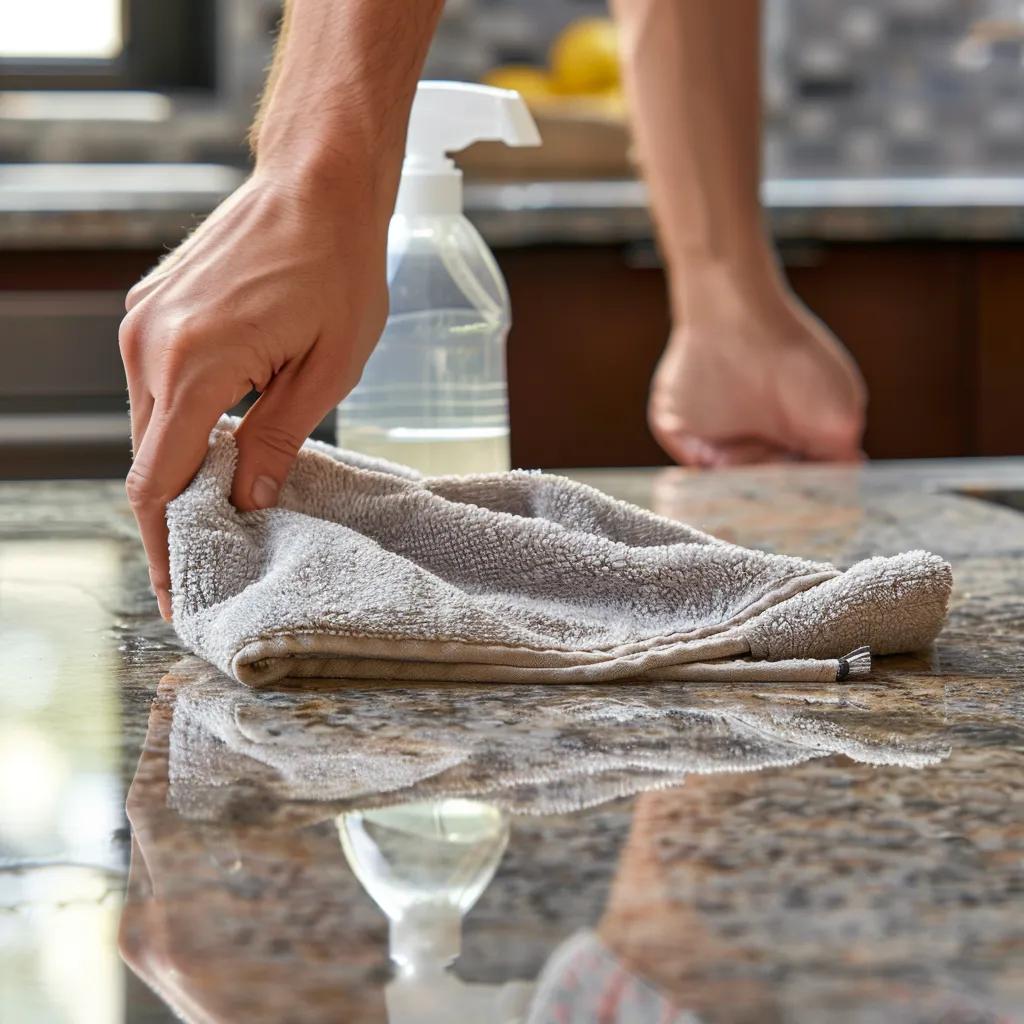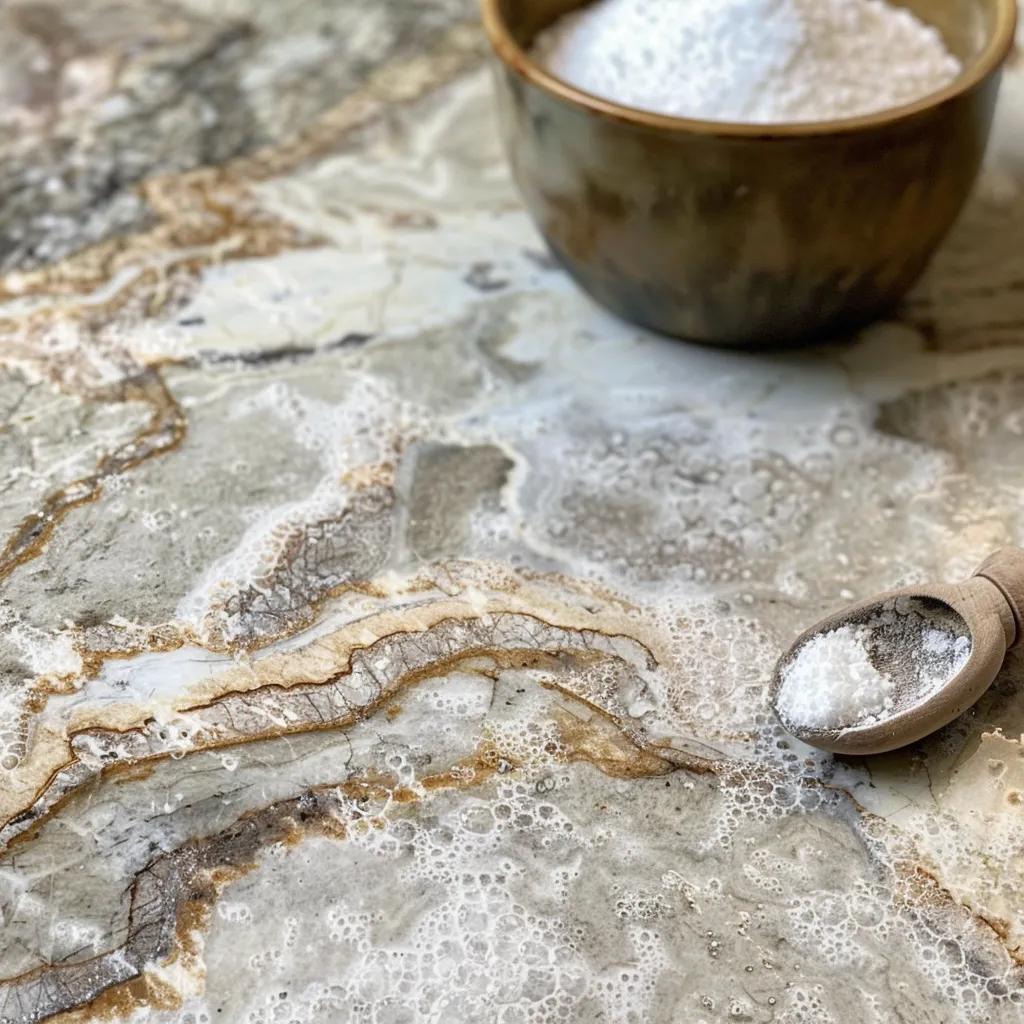Granite Countertop Maintenance Tips for Longevity and Shine

Granite offers unmatched durability and timeless beauty, yet its porous surface can attract grime, stains, and dullness without proper care. Homeowners in Denver can preserve their investment by following targeted cleaning, sealing, protection, stain removal, and repair guidelines. This guide maps out daily cleaning essentials, sealing techniques and timing, damage prevention strategies, stain-specific removal methods, and when to hire professionals—ensuring your granite countertop maintains its shine and lifespan.
How Do You Clean Granite Countertops Daily for Best Results?
Daily cleaning preserves sealant and prevents etching by neutralizing acids and oils on the stone’s surface. A pH-neutral cleaner combined with soft microfiber cloths gently lifts debris without harming the finish. Consistent maintenance enhances shine and strengthens the protective barrier.
Granite Cleaning and Maintenance
Proper cleaning methods are essential for maintaining the appearance and longevity of granite countertops. Using pH-neutral cleaners and avoiding harsh chemicals helps preserve the stone’s sealant and natural beauty. Regular cleaning prevents the buildup of grime and protects against etching and staining.
This guide provides general recommendations for granite care, which aligns with the article’s advice on daily cleaning and product selection.
What Are the Best Gentle Cleaning Methods for Granite?

Effective everyday cleaning balances mild detergent, warm water, and gentle agitation.
- Use a few drops of mild dish soap mixed in warm water to dissolve grease.
- Wipe the surface with a damp microfiber cloth to trap particles.
- Rinse with clean water and dry immediately to prevent water marks.
Frequent gentle cleaning reinforces the sealant and readies the countertop for deeper care routines.
Which Cleaning Products Should You Avoid on Granite?
Acidic or abrasive chemicals can etch the stone or degrade sealant.
- Vinegar, lemon juice, and ammonia–based cleaners
- Bleach or scouring powders with grit
- Harsh degreasers containing acetone or strong solvents
Avoiding these substances maintains the pore-filling sealer and preserves granite’s natural gloss.
How Can You Quickly Handle Spills to Prevent Stains?
Immediate spill response stops liquids from penetrating the stone.
- Blot up spills with a soft cloth or paper towel—never wipe in circles.
- For oily liquids, apply a dry absorbent powder within minutes.
- Rinse the area with mild soapy water and dry thoroughly.
Rapid blotting and neutralization keep granite clear of stubborn discolorations and readies it for routine cleaning.
What Is the Best Way to Seal Granite Countertops and How Often?
Sealing granite fills microscopic pores and repels moisture, stains, and bacteria. An impregnating sealer penetrates deep into the stone, preserving natural texture while boosting stain resistance.
| Sealer Type | Protection Level | Application Frequency |
|---|---|---|
| Penetrating Sealer | High stain resistance | Every 12–18 months |
| Topical Sealer | Gloss enhancement | Every 6–12 months |
Proper sealing enhances longevity and prepares the countertop for daily cleaning practices.
Sealing and Stain Prevention
Sealing granite countertops is crucial for protecting them from stains and moisture damage. Impregnating sealers are recommended as they penetrate the stone, providing superior stain resistance. Regular sealing, typically every 12-18 months, is essential for maintaining the protective barrier.
This source supports the article’s emphasis on sealing and the use of specific sealer types to protect granite countertops.
How Do You Test If Your Granite Needs Sealing?
Perform the water bead test:
- Place a few drops of water on the surface and observe for 10 minutes.
- If water soaks in or darkens the stone, reapply sealer.
- If beads remain intact, the current seal is effective.
This simple check ensures sealant is active before stains take hold.
Which Types of Granite Sealers Are Recommended?
Quality sealers combine deep penetration with neutral pH levels.
- Impregnating sealers (e.g., Granite Gold Premium, Miracle Sealants 511)
- Water-based formulas that won’t yellow or gloss over the stone
- Solvent-based options for extra protection in high-use kitchens
Choosing a trusted brand supports lasting defense without altering granite’s appearance.
How Often Should You Apply Granite Sealer for Longevity?
Most Denver countertops benefit from resealing every 12 to 18 months. High-traffic or wet environments may require twice-annual applications. Adhering to a consistent schedule prevents moisture penetration and maintains stain resistance.
How Can You Protect Granite Countertops from Damage and Wear?
Preventive habits shield granite from scratches, chips, and heat damage. Physical barriers and mindful usage extend lifespan and uphold visual appeal.
- Always cut on a board rather than directly on granite.
- Place hot pots on trivets or heat-resistant pads.
- Use coasters under glasses to avoid ring marks.
These measures reduce mechanical wear and support daily cleaning practices.
What Are the Best Practices to Prevent Scratches and Heat Damage?
- Use wooden or plastic cutting boards for all food prep.
- Position silicone or cork trivets under hot cookware.
- Keep heavy appliances on protective mats to disperse weight.
Consistent use of these barriers maintains the integrity of granite’s surface.
How Does Proper Usage Extend Granite’s Lifespan?
Mindful habits limit micro-abrasions and thermal stress. Regular cleaning and barrier use together slow wear, ensuring the stone’s durability and aesthetic remain intact for decades.
How Do You Remove Common Stains from Granite Countertops?

Targeted stain removal restores uniform color and shine by matching methods to stain composition. Prompt identification and treatment return granite to its original luster.
| Stain Type | Removal Method | Key Ingredient |
|---|---|---|
| Oil Stains | Poultice paste | Baking soda |
| Water Spots | Gentle cleanser | Diluted ammonia |
| Organic Stains | Enzyme cleaner | Hydrogen peroxide |
What Are Effective Methods for Oil and Organic Stain Removal?
For oil and food-based stains,
- Mix baking soda with water to form a poultice paste.
- Spread over the stain, cover with plastic wrap, and leave 24 hours.
- Gently remove residue and rinse with mild soap.
This process draws oils out without scratching or etching the granite.
How Can You Remove Water Spots and Mineral Deposits Safely?
To dissolve mineral buildup,
- Apply a diluted ammonia solution with a soft cloth.
- Let sit for 5 minutes, then wipe and rinse thoroughly.
- Dry immediately to prevent new spots from forming.
Gentle acid-free cleaners lift deposits without compromising sealant strength.
When Should You Consider Professional Granite Repair or Restoration?
DIY care handles routine maintenance, but persistent damage benefits from expert intervention. Professional restoration revitalizes worn or compromised surfaces and extends countertop life.
What Types of Damage Require Professional Attention?
- Deep chips or cracks that penetrate beyond the sealant
- Etching or dull areas from heavy acid exposure
- Extensive scratch patterns affecting uniformity
Skilled technicians use specialized tools to repair and polish beyond household remedies.
How Can Denver Countertop Design Help with Granite Repair Services?
Denver Countertop Design provides localized expertise in granite restoration. Their technicians evaluate damage, apply industrial-grade sealers, and perform precision polishing to recover the original gloss. For repair estimates and service scheduling.
Maintaining granite countertops through cleaning, sealing, protection, targeted stain removal, and timely professional repair ensures enduring shine and structural integrity. Following these practices safeguards your investment and highlights Denver Countertop Design’s expertise whenever advanced care is needed.
Frequently Asked Questions
What are the signs that my granite countertop needs resealing?
To determine if your granite countertop requires resealing, perform the water bead test. Place a few drops of water on the surface and observe for about 10 minutes. If the water beads up, the seal is still effective. However, if the water soaks in or darkens the stone, it indicates that the sealant has worn off, and resealing is necessary to protect against stains and moisture penetration.
Can I use natural cleaners on my granite countertops?
While some natural cleaners may seem appealing, it’s essential to avoid acidic substances like vinegar or lemon juice, as they can etch the surface of granite. Instead, opt for pH-neutral cleaners or a mild soap solution. These options effectively clean without damaging the sealant or the stone itself, ensuring your granite remains beautiful and protected.
How can I prevent scratches on my granite countertops?
To prevent scratches on granite countertops, always use cutting boards for food preparation instead of cutting directly on the stone. Additionally, avoid dragging heavy objects across the surface. Using coasters under glasses and placing mats under heavy appliances can also help minimize the risk of scratches and maintain the countertop’s pristine condition.
Is it safe to place hot pots directly on granite countertops?
While granite is heat-resistant, it’s not advisable to place hot pots directly on the surface. Doing so can lead to thermal shock, which may cause cracks or discoloration over time. Instead, always use trivets or heat-resistant pads to protect your granite countertops from extreme heat and maintain their integrity and appearance.
What should I do if my granite countertop gets a stain?
If your granite countertop gets stained, act quickly to minimize damage. Blot the stain with a soft cloth to absorb any liquid, avoiding circular motions. For oil-based stains, apply a poultice made of baking soda and water, cover it, and let it sit for 24 hours. For other stains, use a gentle cleaner appropriate for granite. Always follow up with thorough rinsing and drying.
How can I maintain the shine of my granite countertops?
To maintain the shine of your granite countertops, regular cleaning with a pH-neutral cleaner is essential. Avoid harsh chemicals that can dull the surface. Additionally, resealing every 12 to 18 months helps protect the stone and enhance its natural luster. Regularly polishing with a granite-safe polish can also help maintain that glossy finish.
What are the benefits of hiring a professional for granite maintenance?
Hiring a professional for granite maintenance offers several benefits, including expert knowledge and specialized tools for effective cleaning, sealing, and repair. Professionals can address deep scratches, chips, or etching that may not be manageable through DIY methods. Their experience ensures that your granite countertops are restored to their original beauty, extending their lifespan and maintaining their value.
Conclusion
Maintaining granite countertops through proper cleaning, sealing, and protective measures ensures their longevity and aesthetic appeal. By following these guidelines, homeowners can effectively prevent stains and damage, preserving their investment for years to come. For those seeking expert assistance, Denver Countertop Design offers specialized fabrication and installation services tailored to your needs. Explore our website today to learn more about how we can help you maintain the beauty of your granite surfaces.
